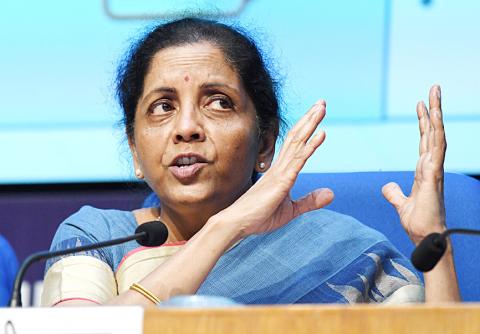India’s steps to boost financial market sentiment and support businesses could fall short of shoring up growth in Asia’s third-largest economy.
Indian Minister of Finance Nirmala Sitharaman announced a number of measures on Friday to help re-ignite an economy that has slowed sharply on the back of weak consumption and a deteriorating global environment.
However, she did not outline any major fiscal support — as businesses had been calling for — focusing instead on steps to spur foreign funds and lending.

Photo: EPA-EFE
Economists, finance leaders, industry executives and local media raised questions about the effectiveness of the measures, which included scrapping a tax on foreign funds, allowing concessions on vehicle purchases and hastening infusion of an already announced 700 billion rupees (US$9.8 billion) of capital in state-run banks.
“These are short-term palliatives,” said Priyanka Kishore, head of India and Southeast Asia economics at Oxford Economics in Singapore. “What India needs is structural reforms to take growth to above 7 percent.”
Data due this week are likely to show the economy expanded 5.7 percent in the quarter ended June, below the 5.8 percent pace seen in the previous three months.
The withdrawal of the additional tax on foreign portfolio investors helped to spur sentiment in stocks, which rallied briefly yesterday.
Overseas investors have pulled out more than US$3 billion from the nation’s stock and bond markets since last month.
The “crisis is not because of decline in ease of doing business or sops for automakers,” Kerala State Minister of Finance Thomas Isaac said via Twitter. “Bank recapitalization had already been announced. What is required is a large fiscal spending package.”
Sitharaman, who last month narrowed the budget deficit target for the current fiscal year to 3.3 percent of GDP from 3.4 percent, ignored the auto industry’s demand for a reduction of a goods-and-services tax on vehicles to halt the worst slump in vehicle sales in almost two decades.
The lack of a fiscal response puts the burden on the Reserve Bank of India (RBI) to continue with its stimulus.
RBI Governor Shaktikanta Das has already cut interest rates to the lowest in nine years.
Top Indian Ministry of Finance officials have shown reluctance for stronger measures. Krishnamurthy Subramanian, the ministry’s chief economic adviser, said government intervention for the private sector presents a “moral hazard.”
The Times of India newspaper said in an editorial that while Sitharaman’s plan was a start, the government needs to do more work to address larger problems of structural deficiencies, which have lowered the nation’s growth potential.
Sitharaman on Friday said that more measures are in the offing to support the economy and an announcement might be made again this week.
“Announcements from the finance minister have potential to boost short-term sentiment,” said Prayesh Jain, executive vice president at YES Securities India Ltd in Mumbai. “But ground realities of weak economic environment needs to change for a tectonic shift in demand.”

Sweeping policy changes under US Secretary of Health and Human Services Robert F. Kennedy Jr are having a chilling effect on vaccine makers as anti-vaccine rhetoric has turned into concrete changes in inoculation schedules and recommendations, investors and executives said. The administration of US President Donald Trump has in the past year upended vaccine recommendations, with the country last month ending its longstanding guidance that all children receive inoculations against flu, hepatitis A and other diseases. The unprecedented changes have led to diminished vaccine usage, hurt the investment case for some biotechs, and created a drag that would likely dent revenues and

Macronix International Co (旺宏), the world’s biggest NOR flash memory supplier, yesterday said it would spend NT$22 billion (US$699.1 million) on capacity expansion this year to increase its production of mid-to-low-density memory chips as the world’s major memorychip suppliers are phasing out the market. The company said its planned capital expenditures are about 11 times higher than the NT$1.8 billion it spent on new facilities and equipment last year. A majority of this year’s outlay would be allocated to step up capacity of multi-level cell (MLC) NAND flash memory chips, which are used in embedded multimedia cards (eMMC), a managed

CULPRITS: Factors that affected the slip included falling global crude oil prices, wait-and-see consumer attitudes due to US tariffs and a different Lunar New Year holiday schedule Taiwan’s retail sales ended a nine-year growth streak last year, slipping 0.2 percent from a year earlier as uncertainty over US tariff policies affected demand for durable goods, data released on Friday by the Ministry of Economic Affairs showed. Last year’s retail sales totaled NT$4.84 trillion (US$153.27 billion), down about NT$9.5 billion, or 0.2 percent, from 2024. Despite the decline, the figure was still the second-highest annual sales total on record. Ministry statistics department deputy head Chen Yu-fang (陳玉芳) said sales of cars, motorcycles and related products, which accounted for 17.4 percent of total retail rales last year, fell NT$68.1 billion, or

In the wake of strong global demand for AI applications, Taiwan’s export-oriented economy accelerated with the composite index of economic indicators flashing the first “red” light in December for one year, indicating the economy is in booming mode, the National Development Council (NDC) said yesterday. Moreover, the index of leading indicators, which gauges the potential state of the economy over the next six months, also moved higher in December amid growing optimism over the outlook, the NDC said. In December, the index of economic indicators rose one point from a month earlier to 38, at the lower end of the “red” light.